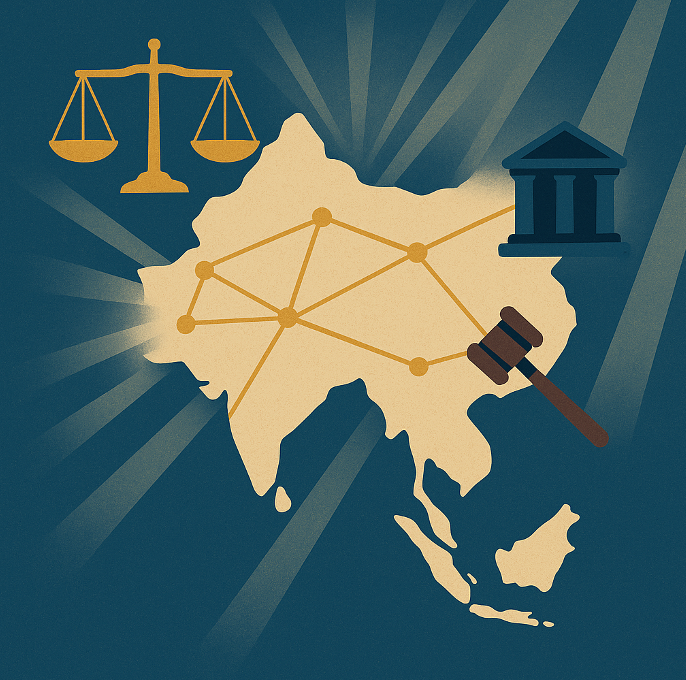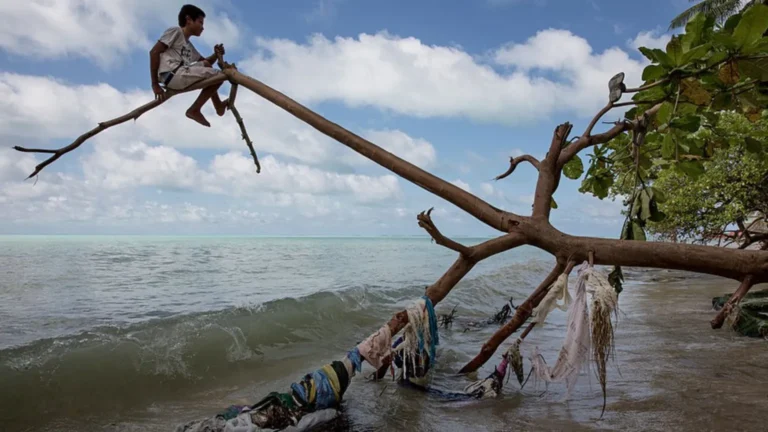By Lijiang Zhu
This blog post is adapted from the author’s presentation at the 10th Biennial Conference of the Asian Society of International Law in Hanoi, Vietnam from 9 to 10 October 2025.
Universal jurisdiction has become the most attractive, albeit controversial, form of national criminal jurisdiction in international law since the turn of the new century. The establishment and exercise of universal jurisdiction by Asian States and the response of Asian States to the establishment and exercise of universal jurisdiction by other Asian or Non-Asian States are not as sufficiently addressed as European States or African States in literature. Therefore, it is very necessary to examine the practice of Asian States in universal jurisdiction.
In 2009, the sixty-fourth session of the General Assembly of the United Nations (UNGA) decided to include the item entitled “The scope and application of the principle of universal jurisdiction” in its agenda. Since then, the UNGA has had this item on its agenda annually. This gives all States in the UN a good chance and platform to collectively express their official positions on universal jurisdiction, which in turn may help identify the opinio juris relevant to the possible development of customary international law in this area. Furthermore, the United Nations requests all States to submit their national legislations and judicial practices to the United Nations. Therefore, it is very significant to have a look at Asian States’ submissions and their views in the Legal Committee of the United Nations.
The situation of Asian States’ submission on national legislations and judicial practice to the UN
As of 2024, a total of 82 States made such submissions to the UN. Among these 82 submissions, 18 submissions were made by Asian States, reflecting 37% of all 48 Asian States. In comparison, Asian States have been moderately active in submitting their views to the UN, while European and South American States have demonstrated significantly higher levels of engagement.
Table 1: Degree of Submissions to the UN
| Continent | Submission States | Number of States | Ratio of Submission |
| Europe | 30 | 44 | 68.1% |
| South America | 8 | 12 | 66.7% |
| Asia | 18 | 48 | 37.5% |
| Africa | 18 | 54 | 33.3% |
| North America | 6 | 23 | 26.1% |
| Oceania | 2 | 16 | 12.5% |
Crimes falling within universal jurisdiction in Asian States
In East Asia, two States made written submissions to the UNGA Legal Committee. According to China’s submission, treaty-based crimes may fall within universal jurisdiction of China. According to South Korea’s submission, the crime of genocide, crimes against humanity, war crimes, terrorism-related crimes and maritime crimes may fall within universal jurisdiction of South Korea.
In Southeast Asia, four States made submissions to the UNGA Legal Committee. According to Thailand’s submission, the crimes of torture, enforced disappearance, terrorism-related crimes, piracy, some economic crimes, human trafficking, and transnational organized crimes may fall within universal jurisdiction of Thailand. According to Malaysia’s submission, war crimes and piracy may fall within universal jurisdiction of Malaysia. According to the Philippines’ submission, the crime of genocide, crimes against humanity and war crimes may fall within universal jurisdiction of the Philippines. Although Vietnam also submitted to the UN, its submission in English is not available on the UN website.
In West Asia, ten States made submissions to the UNGA Legal Committee. According to Qatar’s submission, treaty-based crimes, war crimes, torture, terrorism-related crimes, money laundry crimes, and human trafficking may fall within universal jurisdiction of Qatar. According to Bahrain’s submission, genocide, crimes against humanity, war crimes, aggression, terrorism-related crimes, money laundry crimes may fall within universal jurisdiction of Bahrain. According to Saudi Arabia’s submission, genocide, war crimes, torture, hostage, civil aviation crimes, terrorism-related crimes, money laundry crimes, corruption, human trafficking, drug trafficking, transnational organized crimes and crimes against diplomatic staff may fall within universal jurisdiction of Saudi Arabia. According to Oman’s submission, civil aviation crimes, terrorism-related crimes, money laundry crimes, nuclear-related crimes may fall within universal jurisdiction of Oman. According to Iran’s submission, treaty-based crimes may fall within universal jurisdiction of Iran. According to Türkiye’s submission, torture, civil aviation crimes, money laundry crimes, drug trafficking, pollution, prostitution may fall within universal jurisdiction of Türkiye. According to Iraq’s submission, human trafficking, drug trafficking, and sabotage may fall within universal jurisdiction of Iraq. According to Jordan’s submission, terrorism-related crimes, piracy, human trafficking, drug trafficking, and some economic crimes may fall within universal jurisdiction of Jordan. According to Israel’s submission, genocide, crimes against humanity, war crimes may fall within universal jurisdiction of Israel. Kuwait’s submission fails to present the national legislation or judicial practice of Kuwait on universal jurisdiction, but just generally expresses the position on some aspects of universal jurisdiction.
In Central Asia, four States made written submissions to the UNGA Legal Committee. According to Kyrgyzstan’s submission, genocide, crimes against humanity, war crimes, aggression, crimes against diplomatic staff, pollution, some economic crimes, crimes relating to weapons of mass destruction may fall within universal jurisdiction of Kyrgyzstan. According to Turkmenistan’s submission, genocide, crimes against humanity, war crimes, aggression, torture, terrorism-related crimes, human trafficking, crimes against diplomatic staff, and crimes against state security, public security, public health may fall within universal jurisdiction of Turkmenistan. According to Armenia’s submission, genocide, crimes against humanity, war crimes, aggression, torture, hostage, terrorism-related crimes, human trafficking, drug trafficking, some economic crimes, sexual crimes, computer crimes may fall within universal jurisdiction of Armenia. According to Azerbaijan’s submission, treaty-based crimes, crimes against humanity, war crimes, torture, hostage, civil aviation crimes, terrorism-related crimes, drug trafficking crimes may fall within universal jurisdiction of Azerbaijan.
III. Conditions for exercise of universal jurisdiction
From 2009 to 2023, 24 Asian States made oral statements on the conditions for exercising universal jurisdiction in international law, reflecting 50% of all 48 Asian States, which is more than the number of Asian States making written submissions on national legislations and judicial practice to the UN. This means that some Asian States only made oral statements instead of making written submissions to the UN, for example, Singapore, Myanmar, and the UAE, while some Asian States only made written submissions to the UN instead of making oral statements to the UN, for example, Kyrgyzstan, Turkmenistan and Armenia. Throughout the whole period from 2009 to 2023, many Asian States seemed to be very interested in this topic. They made oral statements every year from 2009 to 2023, for example, Iran, China, Israel, Singapore, Malaysia, and India, while some Asian States began to make their oral statements in the later years of this period, for example, Syria, Myanmar, Jordan, and the UAE. With respect to the conditions for exercising universal jurisdiction under international law, the Asian States that made oral statements expressed varying focus with some addressing only a few conditions, while others addressed many. Among the 24 Asian States that made oral statements, the conditions that they addressed, ranked from the most frequently mentioned to the least, are as follows: respect of fundamental principles of international law, including equality of state sovereignty, non-interference of internal affairs of other States (17), complementary to other forms of national criminal jurisdictions, including territorial jurisdiction and nationality jurisdiction (17), respecting immunity from criminal jurisdiction of foreign state officials (15), respecting the principle of political independence and non-interference in a State’s internal affairs (14), the requirement of the presence of the suspect in the territory of the forum State (6), respecting the principle of due process including the rights of the suspects in criminal proceedings (5), requirement of international mutual assistance in criminal matters (4), requirement of making national legislation as the legal basis (3), control of central level decision (1), prohibition of private litigation for universal jurisdiction crimes (1), no amnesty or pardon (1), and non-retrospective application (1).
Conclusion
This paper conducts a thorough empirical survey of Asian States’ engagement with the topic of the scope and application of universal jurisdiction before the Legal Committee of the United Nations General Assembly from 2009 to 2023. It presents not only the written submissions made by Asian States on national legislations and judicial practice, the crimes falling within the universal jurisdiction of Asian States, but also the conditions of legality raised by Asian States on the exercise of universal jurisdiction in international law in their oral statements made in the meetings of the Sixth Committee of the United Nations General Assembly. The empirical survey reveals that Asian States rank in the middle in terms of the number of written submissions, just after European States and South American States, indicating that Asian States have strong interest in the topic of universal jurisdiction in international law. However, the written submissions from different sub-regions of Asia are varied. Generally speaking, West Asian States have more interests in making written submissions to the UN, while no South Asian States have ever made written submissions to the UN. In terms of the crimes falling within the universal jurisdiction of Asian States, they are extremely different. While one Asian State denies universal jurisdiction over any crime, another Asian State only recognizes the crime of piracy within its universal jurisdiction in international law. While some other Asian States recognize the crime of genocide, crimes against humanity and war crimes falling within their universal jurisdiction, many other Asian States, in particular West Asian and Central Asian States recognize numerous ordinary crimes, which may fall within universal jurisdiction, in their national legislations. In terms of conditions for exercising universal jurisdiction in international law, many Asian States mention the requirements of respecting the fundamental principles of international law, the principle of complementarity and the principle of respecting immunity from criminal jurisdiction for foreign State officials. Generally speaking, Asian States paid more attention to the various conditions limiting the exercise of universal jurisdiction, rather than the importance of universal jurisdiction in combating impunity for serious international crimes.
About the author
Lijiang Zhu is a Professor in International Law at the China University of Political Science and Law.





